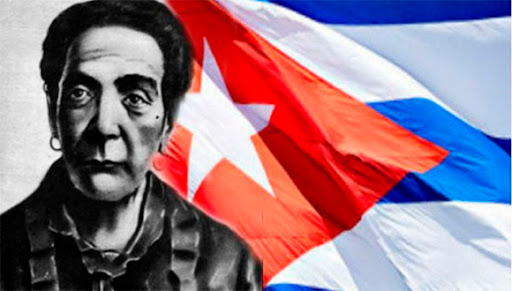
Havana, July 12 – An exceptional example of human conduct, Mariana Grajales Cuello was born on July 12, 1815, in the city of Santiago de Cuba, a rebel land that saw her grow up with an ethical education within her family and also rise in stoicism, when with maternal love and patriotic pride she gave her children to the independence cause.
Her merits went far beyond having brought into the world and forged titans. Like a goldsmith with prodigious hands, she knew how to embroider her story as a mother and a woman; and, both at home and in the rebel camps and in emigration, she defended her space and earned the admiration of those privileged to know her.
On the 210th anniversary of her birth, we remember that Cuban icon of the independence struggles, a transgressor, resilient, patriot who, with all her grace and freshness, married at 16 and had the courage to build a life project, overcoming the prejudices of a society that discriminated against her for being poor, Black, and a woman.
Without losing spirit or tenderness, she continued as a young widow, a family leader with three children in a precarious environment, and later as a spirited young woman, capable of defending ideas and principles, with the courage to register as a natural son, Justo, her fourth child, and to consensually join the love of her life, Marcos Maceo, with whom she created a harmonious home, lavish with affection.
As the mother of 14 children, among them the bold Antonio and José, she was a support, encouragement, and spur for her heroic tribe; she taught her descendants to believe that justice, freedom, and the Homeland were above the very act of life. Thus, having become a paradigm of dedication and consecration, she continues to this day, and her greatest example returns her to us as the Mother of all Cubans.
Cuba treasures an immense legacy of Mariana, who marched to the battlefields with her brood at over 50 years old and never left the combat front during the 10 years of the Great War; the blood nurse of the Liberation Army, who never ceased to treat the wounded and encourage them to return to the fight once their health was restored.
Her greatness lies not only in the fact that she conceived and gave birth to a legion of heroes; Her stature was further enhanced by raising virtuous children, achieving the survival of 11 offspring in the exercise of the best human qualities, training them as good men and women, and forging architects in the struggle for the nation's independence from Spanish colonialism. An extraordinary achievement that society should always appreciate.
All kindness, but strict in discipline, she managed to forge a family sustained by solid values, united through pain and prosperity. Overflowing with joy, she made them swear on their knees to liberate the homeland or die for it, even though her mother's heart palpitated at the possibility of the death of some of her children.
She retained the sweetness of her fruitful motherhood, despite the traces left by that quarter-century of uninterrupted struggle for sovereignty from the small hacienda of Majaguabo, in San Luis, without a moment of weakness, living in caves and other places similar to those of the runaway slaves, crossing rivers, climbing mountains, under the rain or the blazing sun.
She died in Kingston, Jamaica, on November 27, 1893. However, in her native Santiago de Cuba, her grave is permanently laid out, always with flowers to honor the Mother of the Homeland, the courageous woman who put the slave nation's desire for independence before her own feelings.
Faced with such a difficult loss, José Martí summed up in the newspaper Patria: "What was there in that woman, what epic and mystery was there in that humble woman, what sanctity and unction was there in her mother's womb, what decorum and greatness was there in her simple life, that when one writes of her, it is like the root of the soul, with the gentleness of a child, and as if with a deep affection?"
A patriot who knew her well and admired her in the camps and battlegrounds of the independence struggle, Major General José María Rodríguez Rodríguez (Mayía), upon learning of the sad news of her death at the age of 78, said months after the event:
"Poor Mariana, she died without seeing her free Cuba, but she died as good people die, after having dedicated to her Homeland all her services and the blood of her husband and children. Cuba will produce few matrons of such merit, and none with more virtues."
Now the rock that holds the ashes of Commander in Chief Fidel Castro in the Santa Ifigenia heritage cemetery in the Heroic City is near the tomb of the irreducible mambisa, whose life was a song to the courage that the undefeated leader always esteemed; Thus, from the Sierra Maestra, he honored with her name the platoon of courageous women who, with her support, fought for freedom.
The Marianas of today, from the furrow, the factory, the school, the hospital, or the trench, exalt her because they draw from her example, draw from her lineage, and, above all, believe that the most important thing is to exalt her every day so that new generations may be formed with her spirit as human being and in the education of her sons and daughters.
In times of socioeconomic complexity, crisis, and blockade, she is encouragement and strength; her dedication still moves and demonstrates that any obstacle can be overcome with conviction and commitment.
Her light still shines; her example calls us to continue to draw from the sap of this distinguished patriot, who also embodied defiance and determination, and who remains inextricably linked to the life of Cuba, 210 years after her birth. (Text and photo: ACN)